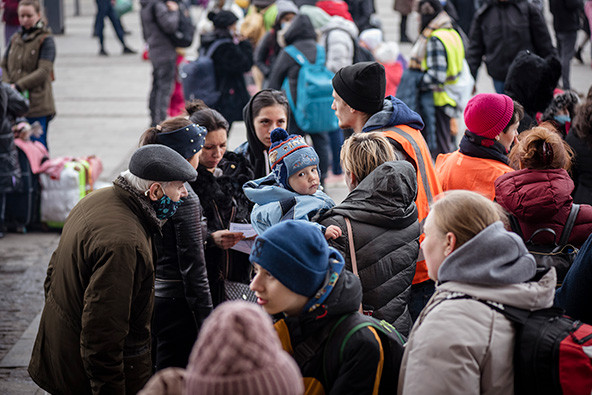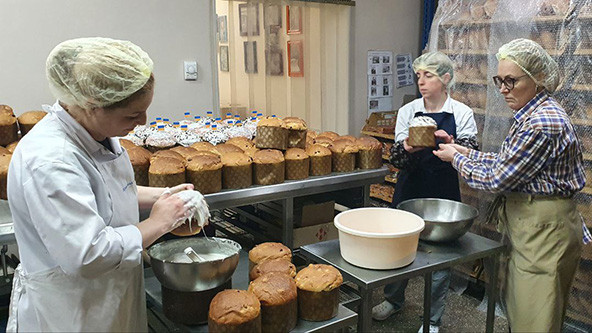 (Photo by iStock/Joel Carillet)
(Photo by iStock/Joel Carillet)
Hostomel, a small city located just northwest of Kyiv near a lush forest, is a beautiful place for thousands of Ukrainians to call home. But five months ago, on February 24, when Russia invaded Ukraine and occupied Hostomel, life was violently transformed by bullets and shelling, destruction, and atrocities. The occupation of Hostomel has since ended, but the war continues and so does its impact on Hostomel and its citizens. Families have begun to return home to piece together fragments of their lives, and as they return, both hope and community persist. Recently a group of neighbors whose apartments were looted and almost completely destroyed by missiles and gunfire decided not to wait for the government to fix their homes, and instead created their own local fund where they could donate to rebuild their apartments and their community together.
Since the war in Ukraine began, there has been devastating violence against civilians; heartbreaking loss of life; and remarkable bravery, sacrifice, and resilience from Ukrainians both in and out of uniform.
There have also been, as there often are during moments of crisis across the globe, inspiring acts of solidarity and generosity. Neighbors are taking care of each other and protecting homes others have been forced to leave behind, business owners and staff are using their facilities and equipment to respond to community needs outside of their normal operations, and local non-governmental organizations (NGOs) are continuing to provide the most vulnerable communities services while taking on new responsibilities of support and aid. Ukrainians are fighting a war for their freedom, and keeping hope alive that they will win. They also still have their jobs and daily responsibilities, they’re raising children and trying to shield them from trauma, they’re volunteering and responding to the needs of their neighbors, they’re uplifting social causes that can be forgotten in the fog of war but are nonetheless critical, and much more.
That human instinct to protect, care for, and nurture each other with whatever one has to offer, whether it’s housing, donated funds, or a meal, carries people through crisis. The act of generosity addresses needs, but it also gives people a sense of agency when chaos is all around; it provides the hope and strength needed to survive, and reminds people that a brighter and safer future will be possible one day. Individual acts of generosity combine to create a much-needed safety net and keep a nation’s civil society infrastructure intact despite being under attack.
Are you enjoying this article? Read more like this, plus SSIR's full archive of content, when you subscribe.
Today, Ukraine continues to be under attack, now entering a sixth month of war. The question “what can be done to support Ukraine?” is still being asked, but support for a country in crisis often tapers off as the conflict grinds on and disappears from the headlines, despite the ongoing need for both crisis response and the everyday services that local organizations continue to provide. Right now, Ukrainians need the world to know they are resilient, but also that they are exhausted and in desperate need of continued support.
It is therefore crucial that the global community listen to Ukrainians to understand their most pressing needs and bear witness to the ways in which Ukrainians are keeping their nation’s civil society alive. Donations are critical, of course, but there’s also immense value in collaboration, partnership, and connections to those who can share their expertise or resources or continue to raise awareness. To help Ukraine, support must focus both on the short term and also on longer term priorities like recovery and rebuilding.
Ukrainians and their local non-governmental organizations need not only global generosity, but they also need global trust—trust that Ukrainians know their needs, infrastructure, and resources best; trust that they know, better than anyone else, exactly how to support and take care of each other now; and trust that they will know how best to rebuild. All too often, conversations about how to best support Ukraine are missing Ukrainian voices.
 Perspectiva 21.3, an organization that supports youth with intellectual disabilities, began cooking and distributing free soup and bread in their cafe when the majority of youths they normally serve fled to safety. (Photo courtesy of Perspectiva 21.3)
Perspectiva 21.3, an organization that supports youth with intellectual disabilities, began cooking and distributing free soup and bread in their cafe when the majority of youths they normally serve fled to safety. (Photo courtesy of Perspectiva 21.3)
Since the first days of the war, Ukrainians have responded with community support and with the expertise, creativity, and flexibility necessary to meet the needs of their neighbors rapidly and efficiently. Tabletochki Charitable Foundation, an organization dedicated to supporting children diagnosed with cancer and providing hospitals with supplies and infrastructure, has allocated efforts to evacuate their wards and their families and arrange their treatment in Poland, the US, and other countries, as well as provide them with financial support.
Perspectiva 21.3, an organization that supports youth with intellectual disabilities, began cooking and distributing free soup and bread in their cafe when the majority of the youths they normally serve fled to safety. The organization found a new purpose, and the cafe became a central hub of aid and support for the neighborhood. At the Zagoriy Foundation, which also leads GivingTuesday Ukraine as part of the global GivingTuesday generosity movement, the mission is the development of a culture of charitable giving through capacity-building resources and grants for local NGOs. After the war began, the team used its connections to continue their work and support local grassroots organizations by creating practical and effective partnerships both in Ukraine and abroad.
Ukrainians are keeping their civil society alive, preserving what the invasion has tried to destroy. They’re offering evacuation services, ensuring medical care is available, making sure food and supplies are delivered, and so much more, even as hospitals, schools, stores, and other places that serve as the heartbeat of a community have been destroyed. And when the war ends, Ukrainian organizations and communities will need a continued outpouring of global generosity and trust to take on the Herculean task of rebuilding, healing, and maintaining the networks of support that provided the many services that will still be needed.
It’s important that the generosity and good being led by Ukrainians is heard loud and clear today, tomorrow, and in the months and years ahead. Ukrainians are inspiring the world with their determination to take care of each other, despite the devastation the country is suffering. And yet, local Ukrainian organizations often get lost in the global response. We need to continue listening and supporting Ukrainians and their locally-led non-governmental organizations, contributing what they need most whatever you have to offer. Ukrainians will make it through this war by relying on their remarkable bravery, strength, and resilience. But the world’s generosity and trust must be steadfast, both through the war and after, for that hope and vision of a safe, healthy, and vibrant future for Ukraine to be realized.
To learn more about how you can help and to support local Ukrainian non-governmental organizations, the authors invite you to reach out to Svitlana Bakhshalieva, International Partnerships Manager at the Zagoriy Foundation: [email protected].
Support SSIR’s coverage of cross-sector solutions to global challenges.
Help us further the reach of innovative ideas. Donate today.
Read more stories by Eugenia Mazurenko & Asha Curran.

